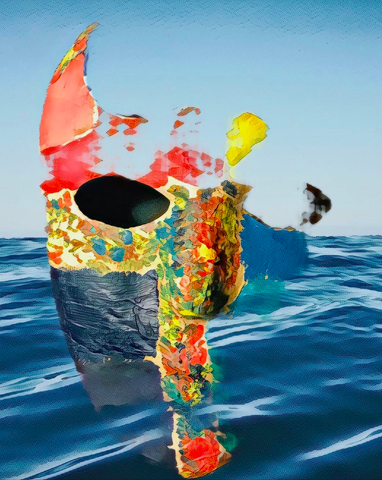UNIVERSITY PARK — Mark B. Stephens, professor in the Penn State College of Medicine, will kick off the 2017-18 Arts and Design Research Incubator lunchtime “Dialogues” series Tuesday, Aug. 29, with “We Wear the Mask: Art and Identity Formation in Higher Education.” He will discuss the use of mask-making to address identity formation in professional communities.
The dialogues, which take place from noon to 1 p.m. in the ADRI, located in 16 Borland Building, explore the interdisciplinary space in arts research.
As a physician, Stephens said he is interested in the visual arts as a form of reflective expression within the context of medical education. “Specifically, I use mask-making to explore identity formation in teachers and students,” he said.
Additional dialogues throughout the fall semester will include:
■ ‘The State of Arts Research at Penn State and Beyond,’ Tuesday, Sept. 12
Andrew Schulz, associate dean for research and associate professor of art history, College of Arts and Architecture
This talk will situate various integrative arts-based research initiatives — the ADRI, Center for Arts and Design Pedagogy, Arts
Entrepreneurship, the Woskob Family Gallery and the Borland Project Space — within the broader national and international landscape.
■ ‘Telling the Microbiome Story,’ Tuesday, Sept. 26
Carolee Bull, head of the Department of Plant Pathology and Environmental Microbiology and interim director of the Penn State Microbiome Centre; Joyce Sakamoto, research associate, entomology; and Cynthia White, media artist, research associate, ADRI
This presentation and discussion will highlight how these researchers began, as well as the process by which they continue, collaborations on a project called Interspecies Microbial Migrations, a documentary film-driven research inquiry investigating the pathways in which microbes move from animals to humans. They will discuss topics from initial project design, to the inherent ethical and procedural considerations involved, along with the basic challenges of engaging in these collaborations.
■ ‘Image and Text Visualization Methods for Research and Creative Practice,’ Tuesday, Oct. 10
Eduardo Navas, assistant professor of new media, School of Visual Arts
Navas will discuss his research on remix consisting of methods and theories of data patterns of communication that are relevant across disciplines. An emphasis of his research is to examine how particular information or content is recycled, repurposed and recombined, and how this leads to new forms of creativity and innovation. This presentation is complemented by a series of workshops in which participants will be able to explore the possibilities of data visualization and analytics for research and creative practice.
■ ‘Matters of Design in Making for the Masses,’ Tuesday, Oct. 17
Aaron Knochel, assistant professor of art education, School of Visual Arts; Tom Lauerman, assistant professor of art, School of Visual Arts; Nicholas Meisel, assistant professor of engineering design and mechanical engineering, School of Engineering Design; Bart Pursel, assistant director, Teaching and Learning with Technology; Marcus Shaffer, associate professor, Stuckeman School of Architecture and Landscape Architecture; and Timothy Simpson, Paul Morrow Professor in Engineering Design and Manufacturing, Mechanical and Nuclear Engineering
This panel will review the ongoing development of ‘Making for the Masses,’ which brings together art, architecture and engineering faculty to design and co-teach an undergraduate course that deals with creativity, design and making. Panelists will focus on aspects of design from across disciplines and in the larger world of making, especially as it relates to the democratization of design. Panelists will review how methodologies in design thinking are implemented through the curriculum.
■ ‘A Post-Digital Future: Definitions, Implications, and Questions,’ Tuesday, Oct. 24
Ann Clements, associate professor of music education, School of Music
The term ‘post-digital’ has been used by various disciplines to draw attention to the changing relationship between digital technology and human social and artistic practices. This presentation explores multiple definitions and uses of the term ‘post-digital’ in several disciplines, including music, arts and design, architecture, business, marketing, media and film studies, and education, and argues that its use reflects a paradigm shift and a new era in these fields. This shift has specific implications for the future practice of arts creation and education, including the impact of digital cleanliness and ease of production, the growing hybridity of digital and traditional art making, and the influence of digital technology on human artistic practice.
■ ‘Wearing Multiple Hats in the Science-Art World,’ Tuesday, Oct. 31
Julia Buntaine, visual artist, director/EIC of SciArt Center and Magazine, innovator-in-residence at Rutgers University
This talk will provide an overview of Buntaine’s neuroscience-based artwork, as well as cover her efforts to cultivate a third culture at large through teaching, publishing and organizational activities.
■ ‘Sonifications of Oxygen and Temperature Data in the Ocean: Creating a ‘Data Stethoscope’,’ Tuesday, Nov. 7
Mark Ballora, professor of music technology, School of Music
Ballora will discuss a project he will be embarking on with Karen Wishner, professor of oceanography at the University of Rhode Island.
“Sonifications of Oxygen and Temperature Data in the Ocean: Creating a ‘Data Stethoscope’ to Detect the Ocean’s Vital Signs” will involve the creation of a “data stethoscope” to translate into sound measurements of temperature, oxygen and biomass collected from the ocean’s depths. The sonifications may reveal interactions between biological and physical properties of the ocean’s oxygen-minimum zones that are not evident through visual graphs alone.
■ ‘Mindfulness Training for Health,’ Tuesday, Nov. 14, noon to 1:30 p.m. (dialogue and workshop)
J. David Creswell, associate professor of psychology, Carnegie Mellon University
This workshop will introduce mindfulness training as a tool for improving mental and physical health. We will discuss theory and explore practical approaches for practicing mindfulness, consider the scientific evidence for mindfulness training effects on health, and evaluate new research indicating how mindfulness training might get under the skin to influence our brain and physiology for health.
The ADRI provides support for high-impact arts and design research projects. For more information and to view the full listing of dialogues, workshops and events, visit www.adri.psu.edu, or connect with ADRI on Facebook at www.facebook.com/PennStateADRI.



